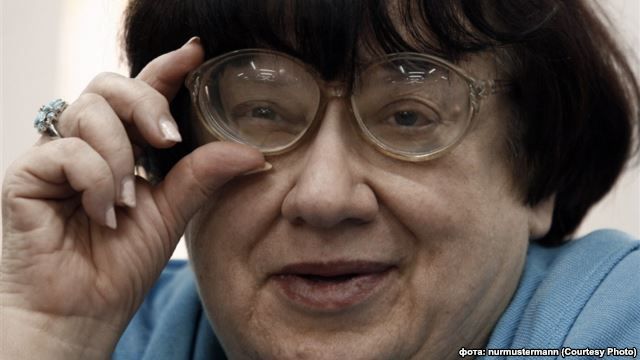 Russian dissident and activist Valeria Novodvorskaya (undated)Even in death, Valeria Novodvorskaya remains controversial.
Russian dissident and activist Valeria Novodvorskaya (undated)Even in death, Valeria Novodvorskaya remains controversial.
Perhaps the most uncompromising and outspoken member of the post-Soviet political opposition in Russia, Novodvorskaya died in Moscow on July 12 at the age of 64.
"She was the most straightforward and sincere person I ever knew," wrote former oligarch and Russian political prisoner Mikhail Khodorkovsky. "She said out loud the things we only whispered. She never reconciled herself to the things we reconciled ourselves to."
Others, like journalist and political commentator Aleksandr Grishin, were less charitable.
"She was an enemy of the country I was born in," Grishin wrote in the mass-circulation tabloid "Komsomolskaya Pravda" on July 13. "And of the country where I live now. An enemy of Russia and of Russians has died. Dedicated, principled, and stubborn."
An uncompromising free-market liberal Westernizer, Novodvorskaya lived almost her entire life in opposition to the Kremlin. Her criticism of the Soviet authorities began when she was just a teenager, and she continued her broadsides against the Kremlin well into the post-Soviet period, assailing the Russian government's authoritarian tendencies -- particularly under President Vladimir Putin.
Speaking on RFE/RL's Russian Service in September 2013, Novodvorskaya described the Putin government as a "Chekist junta." Her prescription for healing Russia clearly demonstrates how stubbornly out of step she was with the prevailing political moods of her country.
"Russia should first make a Western choice," she said. "And humbly sit down at a school desk and learn from Western democracies. [It has] to remember the era of [former President Boris] Yeltsin -- the happiest in our history -- and write on its banners the words of [Yeltsin's former acting Russian Prime Minister Yegor] Gaidar -- 'Liberty, Property, Rule of Law.' And maybe also add 'humanism.'"
On his Facebook page on July 14, Russian nationalist and Eurasianist ideologue Aleksandr Dugin described Novodvorskaya's oeuvre as "simply a manifesto for [Russia's] fifth and sixth columns."
'Down With Soviet Power!'
Publicist, politician, social critic with a sharp-tongued wit, Novodvorskaya was born in 1950 in the city of Baranovichi in today's Belarus.
On December 5, 1969, at the age of 19, she threw anti-Soviet leaflets from the balcony of the Kremlin Palace of Congresses reading "Down with Soviet power!" and protesting the Warsaw Pact invasion of Czechoslovakia the previous year.
Among the evidence against her at that first trial was an original poem addressed sarcastically to the Communist Party of the Soviet Union that included the words:
Thank you, party
For our nights full of despair,
For our shameful silence,
Thank you, party.
That conviction led to her being confined to a Soviet psychiatric hospital, an experience she describes in her aptly titled book, "Beyond Despair."
She was convicted of anti-Soviet activities again in 1978, 1985, and 1986. She faced criminal investigations for her political activities again in 1990, 1991, 1994, 1995, and 1996. In August 2008, she spoke out against Moscow's actions in the brief war against Georgia. In 2010, she was among the first signatories of an opposition petition called "Putin Must Go."
She was critical of Moscow's annexation of the Ukrainian province of Crimea in March and its actions in eastern Ukraine.
The silence of the Russian people in the face of authoritarian repression is a theme Novodvorskaya hammered throughout her career. It was the subject of her last blog post, published a week before she died:
"Why are the Russian people silent? This is not the Russian people. This is a crowd with the worldview of manic-depressive slaves. When did we see the Russian people in mass? I saw them on March 15, when 50,000 came out in defense of Ukraine -- a demonstration that our Soviet television to this day recalls with hatred. That was the Russian people. The rest are Soviet people…. Why were they silent when people were driven to [the GULAG camps in] Magadan? When the 'kulaks' were liquidated? They had grown accustomed to being silent."
'Come On, Russians!'
Orthodox priest Yakov Krotov, who hosts a program on RFE/RL's Russian Service, knew Novodvorskaya well and lauded her "heroic biography."
"Heroism is very important, particularly in Russia, where heroism is understood exclusively as advanced cannibalism," he said. "But Novodvorskaya's heroism concealed the fact that she was a person with a European education and a talented publicist. Her political articles and literary essays stood head and shoulders above everything else in terms of their content and their passion."
Novodvorskaya was a founder of the Democratic Union and Western Choicepolitical parties. She also served on the editorial board of the liberal news magazine "The New Times." She was active on social media likeFacebook and published a lively video blog with former Duma Deputy and Western Party co-founder Konstantin Borovoi.
A memorial service was to be held in the Moscow Sakharov Center on July 16. Upon hearing the news of Novodvorskaya's passing on July 12, Russian pop singer Alla Pugachyova tweeted: "If 1 million people come to Novodvorskaya's funeral and do not go home, then Putin is finished. Come on, Russians!"
 В Атырау -10
В Атырау -10